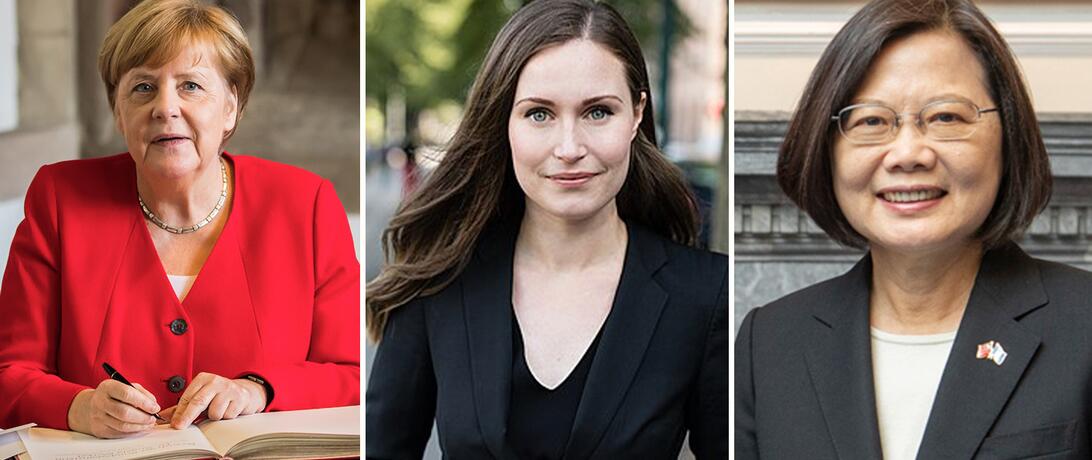
What traits determine who is a good leader? How will those traits evolve with emerging security threats like climate change and global pandemics?
Our Secure Future seeks to promote and raise the voices, thoughts and policy opinions of women around the globe. Particularly when it comes to security, conflict prevention and resolution, and peace. As a guest blog, the views expressed in this publication do not necessarily reflect the views of Our Secure Future or One Earth Future.
The year 2020 will go down in history as the year when modern, globalized economies were shut down by a pandemic. German Chancellor Angela Merkel. Finnish Prime Minister Sanna Marrin. Taiwanese President Tsai Ing-Wen. All leaders of countries where the pandemic hit, but where by all measures of success fared better than many others. During COVID-19, these women have shown extraordinary leadership. A recent article in Harvard Business Review asked whether their positive performance will reshape notions towards women’s leadership. The broader question, however, is whether their performance indicates a change in notions toward leadership generally.
In the past, voters have favored “manly,” often self-centered, ego-related traits such as decisiveness, confidence and assertiveness as desirable characteristics for leaders, with communal traits more associated with women, like empathy, seen largely as a favorable “add-on.” The preference for “manly traits” has been especially prevalent in countries where leaders are selected by direct election rather than in parliamentary systems where a need to cooperate and compromise are necessary to advance.
With COVID-19, however, communal traits like empathy and trust have increasingly been considered as important leadership traits, and those traits require as much or more personal confidence of a leader as assertiveness. Furthermore, successful women leaders have shown themselves more able than men to straddle the line between necessary, useful confidence and counterproductive over-confidence.
The need to resist too much ego involvement in policy, thereby inhibiting flexibility, is much discussed in leadership literature. The Presidential Character, a 1973 book by political scientist James David Barber, characterized presidential leadership styles by their “worldview.” Richard Nixon and Lyndon B. Johnson were among those plagued by too much ego investment in either their policies or their position.
Former Harvard Kennedy School Dean Joseph Nye, Jr., in his 2010 book The Powers to Lead, referencing Aristotle’s classical virtues of character, courage, justice, prudence and temperance, discusses the need to control “ego-ism” and the perils of not doing so. Perhaps most simply, Rasmus Hougaard and Jacqueline Carter state in a 2018 Harvard Business Review article that, “Ego is the enemy of good leadership.”
However, a 2018 Pew poll found that Americans see ambition and decisiveness, traits often related to ego, as traits more beneficial to men than women in their climb to the top. Both men and women can feel pressured to model these characteristics in order to seem like better leaders. Compassion and empathy, other-related rather than self-related traits, are most often associated with women leaders. David G. Smith, Naval War College Professor and co-author of the book Good Guys, stated in a 2019 Forbes interview, “The fact is that harmful stereotypes do exist about what it means to be masculine, focusing on power dynamics, domination of other men, subjugation of women, violence and aggression.” But stereotypes – for both men and women – are changing.
A word needs to be said about humility as a leadership trait as well, given that women tend to score higher than men on that trait. Humility is too often associated with indecisiveness or lack of ambition. Quite the contrary, it is most often simply the opposite of arrogance – and arrogance exacerbates inflexibility associated with ego. Humility lets an individual consider options, and change course if necessary, and be willing to “do the right thing” at personal cost rather simply wanting to win at any cost.
Confidence, therefore, is a two-sided coin. Confidence is a necessary and desirable leadership trait. But overconfidence can be a liability if it leads to an individual not being willing or able to know their own limitations. In fact, studies of what is known as the Dunning-Kruger effect have shown that it is often individuals with the lowest competence who are most overconfident in their ability, due to either ego or knowledge gaps.
Society has taught men that attention, recognition and action are ways to feed their ego, thereby pushing them to over-confidence. Women, traditionally taught by society to serve others, have striven to be likable, thereby creating the dilemma of women being viewed as either likable or competent, but almost never both. Some women leaders recently, however, have demonstrated that avoiding the toxic draw of ego can result in better, more effective policy.
Different cultures put less or more emphasis on traits like ambition, arrogance, decisiveness, humility, trust and empathy according to gender, from strong patriarchal or autocratic countries leaning more toward ego-centrism, to more egalitarian and democratic countries leaning more away from ego-centrism. How that has come into play globally as related to COVID-19 further validates the importance of leader flexibility and the dangers of too much ego.
The leadership “lessons learned” from COVID-19 begins with consideration of what and how the women leaders in countries that fared well did, and why their citizens positively responded.
Joan Johnson-Freese is a University Professor in the National Security Affairs Department at the Naval War College in Newport, Rhode Island. She also teaches courses on Leadership and Women, Peace & Security at Harvard Summer and Extension Schools, and is the author of Women, Peace and Security: An Introduction (2018).
Chuck Houston is a graduate of Harvard Extension School and is pursuing a graduate degree in Data Analytics at Northeastern University. He works in the software industry as a data analyst and has served as a research and teaching assistant in Women, Peace & Security at Harvard Extension and Summer Schools.
Article Details
Published
Written by
Topic
Program
Content Type
Opinion & Insights